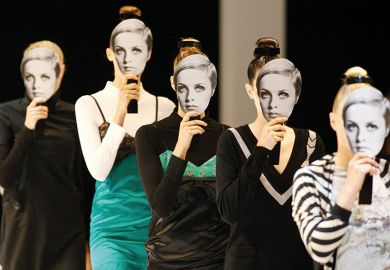More than half of academics are employed on precarious contracts, claims a report by the University and College Union on the “hire-and-fire culture of insecure working” within higher education.
Some 54 per cent of all academic staff and 49 per cent of teaching staff at UK universities are employed on “insecure contracts”, according to the study, Precarious Work in Higher Education: A Snapshot of Insecure Contracts and Institutional Attitudes, published on 14 April.
However, an even larger proportion of academic staff at more junior levels are on such contracts, says the report, which states that “fixed-term employment is the norm” for early careers staff.
About 58 per cent of the 62,113 lecturers, research fellows, researchers and teaching fellows – some 35,000 in total – are employed on fixed-term contracts, according to data obtained by the UCU from the Higher Education Statistics Agency.
Seventy-six per cent of teaching and research assistants – 18,208 overall – are on fixed-term contracts, whereas just 12 per cent of professors and 8 per cent of senior/principal lecturers, readers or principal research fellows are, the Hesa data indicate.
Meanwhile, some 38,000 staff were on teaching-only contracts in 2013-14, says the report, which also drew on requests for information from universities about their use of hourly paid, fixed-term and zero-hours staff because, it says, Hesa data gave a “very poor” indication of the size of the academic precariat.
Big problem ‘below the surface’
“Precarious work is a far bigger issue than universities want to admit,” says the report. “The available data make it impossible to see how many people teaching in our universities are being paid by the hour or placed on highly precarious and exploitative contracts, though the figures we do have suggest a very big problem below the surface.”
It dismisses claims from some universities that large numbers of academic staff are happy to work on flexible contracts because such terms allow them to combine teaching or research with other types of professional employment.
“It’s simply impossible to imagine that a workforce of this magnitude is comprised entirely, or even largely, of the people who conform to the employers’ caricature of the jobbing professional who relishes the flexibility,” it adds.
The report also names 50 universities with the “highest insecurity ranking”, based on the proportion of staff employed on flexible or atypical contracts.
Among those highlighted as having a high degree of staff insecurity are the universities of Bath, East Anglia, Lancaster, Kent, Oxford, Plymouth, Stirling and Warwick, as well as City University London, Queen Mary University of London and London Metropolitan University.
“Nearly half of university teaching staff are on insecure contracts – a scenario that is sure to shock university students and is far worse than universities will own up to,” said Sally Hunt, UCU general secretary, adding that this job insecurity was likely to “compromise” their ability to teach or research.
The UCU is calling on universities to conduct a joint review with the union of all its non-permanent posts to help improve job security and career progression, as well as publishing information on how many of its staff are on temporary contracts and what proportion of students are taught by them.
However, the Universities and Colleges Employers Association (Ucea) disputed the UCU’s figures, saying that Hesa data show that 75 per cent of teaching staff “are on open-ended, not insecure, contracts” and that paid students made up the “majority of the casual employment in institutions”.
Universities “provide excellent examples of fair and equitable employment practices while achieving appropriate flexibility in their workforces”, it added, saying that it was “particularly disappointing” that the UCU had failed “to acknowledge the national joint work done and being done” on the issue.
Universities with the highest UCU “insecurity ranking”: all academic staff
| Institution | Percentage of staff on “insecure contracts” |
| London School of Hygiene and Tropical Medicine, University of London | 78.5% |
| University of Oxford | 76.1% |
| Queen Mary University of London | 75.0% |
| University of Buckingham | 74.5% |
| University of Manchester | 74.5% |
| Edge Hill University | 72.6% |
| University of Warwick | 72.6% |
| Anglia Ruskin University | 72% |
| University of East London | 70.8% |
| University of Chester | 70.3% |
Universities with the highest UCU “insecurity ranking”: teaching staff only
| Institution | Percentage of staff on “insecure contracts” |
| University of Buckingham | 76.8% |
| Edge Hill University | 73.0% |
| Anglia Ruskin University | 72.0% |
| University of Warwick | 70.7% |
| University of Chester | 70.2% |
| University of Bradford | 69.0% |
| University of Manchester | 68.7% |
| Queen Margaret University | 68.2% |
| University of Edinburgh | 67.5% |
| University of Birmingham | 67.0% |
Source: "Precarious work in higher education: a snapshot of insecure contracts and institutional attitudes", published by the University and College Union on 14 April 2016
Note: “Insecure contracts” equate to those academic staff on either fixed-term or atypical contracts, as reported to the Higher Education Statistics Agency for the 2013-14 academic year. Higher education institutions defined as “atypical” by UCU – mostly, small & specialist, including arts schools and conservatoires – have been excluded from this list. Figures in second table are calculated on the basis of Hesa data for 2013-14 on those employed either on teaching and research or teaching only contracts.
POSTSCRIPT:
Print headline: Fixed-term work is now the norm for early career academics, says UCU
Register to continue
Why register?
- Registration is free and only takes a moment
- Once registered, you can read 3 articles a month
- Sign up for our newsletter
Subscribe
Or subscribe for unlimited access to:
- Unlimited access to news, views, insights & reviews
- Digital editions
- Digital access to THE’s university and college rankings analysis
Already registered or a current subscriber? Login




